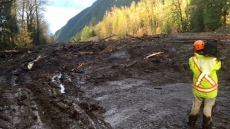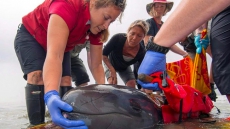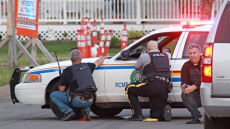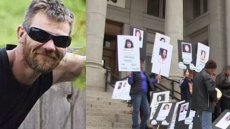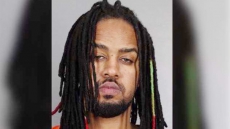GOOSE BAY, N.L. — Prime Minister Justin Trudeau has "humbly" apologized for abuse and cultural losses at residential schools in Newfoundland and Labrador, saying the gesture is part of recognizing "hard truths" Canada must confront as a society.
Speaking at a ceremony with former students in Goose Bay, Trudeau apologized on behalf of the government of Canada and all Canadians to former students at five schools in the province.
He said their parents were promised their children would be cared and provided for and would be safe.
"However we know today that this colonial way of thinking led to practices that led to deep harm," said Trudeau.
He said the children were isolated from their families, uprooted from their communities and stripped of their identity. They were made to feel "irrelevant and inferior" and taught to be "ashamed of who they were and where they were from."
"I humbly stand before you to offer a long-overdue apology ... on behalf of the Government of Canada and all Canadians," said a visibly moved Trudeau.
"To all of you we are sorry."

"The kind of thinking that led to the establishment of the residential school system and left deep scars for so many has no place in our society. It was unacceptable then and it is unacceptable now."
The former students were left out of a compensation package and national apology in 2008 by former prime minister Stephen Harper. His Conservative government argued that Ottawa didn't oversee those schools, but the Liberal government offered last year to settle a class-action lawsuit for $50 million.
The crowd gathered Friday at an auditorium in Goose Bay cheered both Trudeau and Toby Obed, who accepted the prime minister's apology on behalf of school survivors.
Obed approached the stage with his arms raised in triumph, and became overcome with emotion as he spoke.
"Because I come from a patient and forgiving culture I think it is proper for us to accept an apology from the Government of Canada," said Obed.
"This apology is an important part of the healing. Today the survivors in Newfoundland and Labrador we can finally feel a part of the community of survivors nation-wide across Canada. We have connected with the rest of Canada — we got our apology."
Obed thanked Trudeau and the minister of Crown-Indigenous relations, Carolyn Bennett, for coming to Labrador and giving an apology "we deserve."
"And it's in person, it was not on the news. We didn't have to go out to them, they came to us," Obed said to applause.
However Innu leaders boycotted event and won't accept the apology, saying Innu children suffered in other places besides residential schools.

The leaders issued a statement saying they met with members of their community on Thursday and received a clear message.
"The response from members of our community has been quite emotional, it is clear that Innu need apologies for more than the experience in the International Grenfell Association run residential school dormitories," Grand Chief Gregory Rich said in the statement.
"I’m not satisfied that Canada understands yet what it has done to Innu and what it is still doing.”
The statement says Innu children were abused in Roman Catholic schools and in the homes of teachers and missionaries in the communities of Sheshatshiu and Davis Inlet. It said governments haven't recognized that.
"The truth of what happened to the past generations of Innu has never been fully documented and we can’t deal with this in bits and pieces," said Chief Eugene Hart of the Sheshatshiu Innu First Nation.
There were stacked boxes of Kleenex leading into the auditorium where Trudeau arrived early Friday.
Hundreds of former residential school students, many of them in ceremonial Inuit and Innu dress, hugged each other as they waited for the event to begin.
Miriam Saunders of Goose Bay, whose daughter Loretta was murdered in Halifax in 2014 by a man she had sublet her apartment to, said abuse and cultural losses at residential schools had ripple effects.
"I didn't want to come here," she said Friday outside the auditorium.
Saunders said the scope of the class-action settlement caused confusion and deep hurt because of those it left out.
Saunders attended the residential school in North West River near Goose Bay from 1971 to 1974. She was 12 when she first arrived.
Saunders said she was sexually abused by a female and a male staff member. Still, she considers those years among the happiest of her life.
"I wanted to get married and live in North West River."
Saunders received both general and abuse compensation. But she said it was her father and others who attended the schools before 1949 who suffered far worse.
"He was beaten," she said of her father, who went to the Makkovik school and later refused to teach her Inuktitut to spare her a similar fate.
The $50-million class-action settlement reached with Ottawa last year did not include students who attended before Newfoundland joined Confederation in 1949. Before then, it was a separate dominion.
"The British government should be apologizing," Saunders said.
Several health workers were on hand Friday to offer emotional support.
Memorial candles were lit in honour of more than 120 former students who died waiting for a resolution to the almost decade-long legal fight.
A striking seal skin backdrop on the auditorium depicted a broken red heart rising to a healed heart on a silver grey seal skin.
It is a piece called The Healing by Rigolet artist Inez Shiwak, designed with her father Jack.
